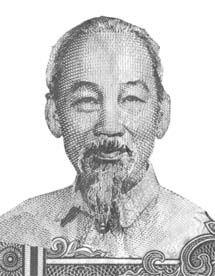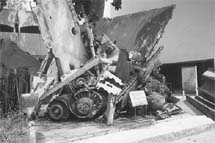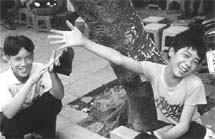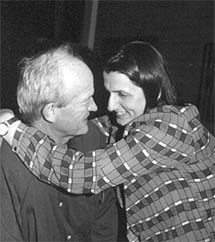Snakes head soup and other joys
By Kim Rowe
Thirty years ago I didn't particularly want to go to Vietnam,
not that there was much choice with conscription and the like. I seem
to remember that there were a lot of bombs being chucked fairly indiscriminately
around and people were getting shot on a regular basis. Back then, it
was a time and place to be very cautious about approaching.
But time marches on and when the chance came up for a trip to the Nam
for purposes of educational exchange and study opportunities, Marie
and I jumped at it. No more bombs and the promise of a different taste
of the world. Victoria Street in Richmond had given us a keen taste
for Vietnamese food and the people were really pleasant as well. So
off we went on the big adventure.
As we flew in over Hanoi, the first impression of the countryside became
the most lasting - lush, green paddy fields stretched out around orange-tiled
hamlets clustered tightly together, with long threads of people going
about their business. And they were either walking or riding on one
of the millions of pushbikes or motorbikes that populate the country.
Hanoi itself is the same - it's cramped and crowded and full of smog
from thousands and thousands of small motorcycles. It used to be a pushbike
economy - all those quaint pictures of ladies with peaked peasant hats
riding the old deadly treadly at the same time as balancing the long
stick balanced at either end by their carry bags full of exotic goods.
Well, they're still there but so are these millions of scooters.
Try and cross the road - our delegation was advised to just walk at
a steady pace across the road and the bikes will accommodate you. Hah!
In the end I used to just close my eyes and cruise, praying to any convenient
deity that this wasn't going to be the last crossing. And it worked.
No curses, no insults. The riders just lined you up and cruised around
you. Even though we were bombing the tripe out of them thirty years
ago and here was a perfect pay-back situation, they followed the unwritten
rules and let the whities go.
In fact, the Vietnamese people we ran into, and they all wanted to talk
to you in English, were some of the most courteous and hospitable people
we'd met. They had an incredible curiosity, they were crazy for learning
English and Australia and Australians were AOK as far as they were concerned.
The place is a teacher's Heaven. The kids realise that if they don't
learn, they'll starve. There's no social security net there and they
also realise that modernisation and information technology is the future.
The government is pushing it but they're poor, precariously poor as
a nation.
America lost that little war, the first one ever and they haven't forgotten.
Or forgiven. There've been no World Bank contributions, no generous
Aid gestures from the great U.S. of A. and it's not hard to see the
results.
Basically, the country is so run-down it's best described as dilapidated.
There are some beautiful tree-lined boulevards, courtesy of the French
colonial era, but the streets are dug up and the footpaths are dippy
and dangerous. There's an air of imminent poverty all over the place.
So people work at what they can get. They hassle you, like anywhere,
to buy post cards and dictionaries or phrase books.
But also they recycle, rebuild, repair. Nothing is wasted. The most
incredible little stalls where they jerry up an old generator for a
bike or create new muffler systems for them. Just outside a building
where the latest IBM PC can be seen is a squatting tradesman retwisting
old wire to manufacture some mysterious part for a beaten-up old machine.
The war is never far away from memory and it's quite remarkable that
the resentment, which could be bitter and provocative, just isn't present.
The veterans with stumps instead of arms or legs, the fact that there
just isn't a generation of people my age, the dozens of close-packed
cemeteries and s all over the countryside are just reminders of a war
that devastated Vietnam for more than thirty years. They fought the
Japanese, they fought the French, they fought the Americans, the Australians,
the New Zealanders, the Koreans and then they fought the south Vietnamese.
And they won in the end.
It cost them a lot, in youth, in growth and development at a vital time
in world history and they commemorate the war victories and their champion
Ho Chi Minh. The mausoleum and Museum glorifying this great leader are
some of the most splendid buildings in a city that probably found it
hard to afford them. But they're there and people pour into them both,
still remembering the man who saved them from the 'imperial aggressors'
and who freed their nation. They're proud of him.
The Army museum is incredible. A towering sculpture made from downed
enemy bombers stands next to the tank that crashed through the gates
of the Imperial Palace in Saigon (now Ho Chi Minh City) in 1975 signifying
the defeat of the south. Just over there sits a Mig 21 fighter that
had been flown by nine different pilots and which had blasted fourteen
of the imperialist aggressor's planes from the sky. They don't make
a meal of it, but those imperialist aggressors aren't forgotten just
yet.
And they don't make a meal of it because they know they need help from
the West. They're welcoming tourists, the French appear to have developed
a self-righteous conscience are apparently about to provide some form
of assistance, Australia has worked on re-afforestation with them via
the CSIRO, they're exploring fisheries and marketing with the EU. And
they're pushing education to the extent that an incredible 24% of the
GDP is being poured into education.
But so much is traditional Vietnamese still and it's charming. The ladies
in the peasant hats, the beautiful herbs and fruits and the bewildering
array of things on sale from what is still a market economy. They laughed
at the silly whities taking photos of all of the different eggs on sale
and the carp swimming in three inch pans waiting for the chopper and
the poor old chooks in wire baskets waiting for their necks to be wrung.
But the baked dog market, where the little tails stuck out disconsolately
from the attractive roast rumps of what used to be Towser or Butch or
Spot was just a bit much for Marie to take.
And the food was great. Eat on the streets at little stalls for about
80 cents (just carry your own chop sticks to be on the safe side), try
all those things you'd get in a good Vietnamese restaurant in Melbourne
and then settle in for something a little more exotic. Tuck the bib
into the collar, lean back and wait for the fried pig uterus and the
snake head's soup. Oh yeah!
Ah, travel is so broadening!


Bits of shot down
American war machines are reconstructed as public monuments to the futility
of War.


The happy travellers
return home.